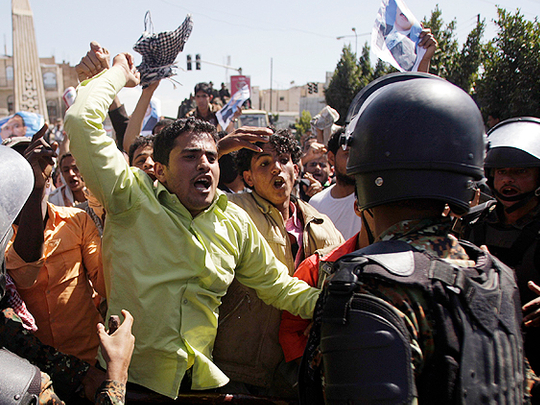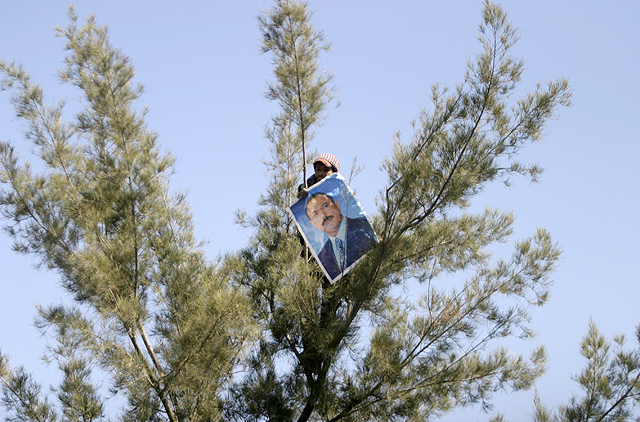
Dubai: Drawing inspiration from the revolt in Tunisia, thousands of Yemenis fed up with their president's 32-year rule demanded his ouster on Saturday in a noisy demonstration that appeared to be the first large-scale public challenge to the strongman.
Clashes also broke out Saturday in Algeria, as opposition activists there tried to copy the tactics of their Tunisian neighbours, who forced their longtime leader to flee the country more than a week ago.
In Tunisia, anti-government protesters marched through the capital, raising the pressure on Prime Minister Mohammad Ghannouchi to quit in the wake of the former president's ouster.
Public assemblies of more than three people are officially banned under a state of emergency that remains in place, along with a night-time curfew.
The curfew has been eased and schools and universities, which have been shut since January 10, are expected to begin re-opening this week.
First-of-a-kind Yemen protests
The protests in Yemen appeared to be the first of their kind. The nation's 23 million citizens have many grievances: they are the poorest people in the Arab world, the government is widely seen as corrupt and is reviled for its alliance with the United States in fighting Al Qaida, there are few political freedoms and the country is rapidly running out of water.
Female activist arrested
Yemeni police have arrested a female press freedom activist known to have been involved in pro-Tunisia revolt protests, rights activists, her family and a security official said on Sunday.
Tawakel Karman, who heads the rights group Women Journalists Without Chains, was stopped by plain-clothes police in a main street as she was heading home with her husband, according to rights activists who declined to be identified.
The reason for her arrest was unclear, but she is being held in Sanaa’s main prison, according to her family.
Calls for Saleh to resign
Meanwhile, calls for Yemeni President Ali Abdullah Saleh to step down had been a red line that few dissenters dared to test.
In a reflection of the tight grip Saleh's government and its forces have in the capital, Saturday's demonstration did not take place in the streets, but was confined to the grounds of the University of Sana'a.
Around 2,500 students, activists and opposition groups gathered there and chanted slogans against the president, comparing him to Tunisia's ousted President Zine al Abidine Bin Ali, whose people were similarly enraged by economic woes and government corruption.
"Get out get out, Ali. Join your friend Bin Ali," the crowds chanted. One of the organisers, Fouad Dahaba, said the demonstration was only a beginning and they will not stop until their demands are met.
"We will march the streets of Sana'a, to the heart of Sana'a and to the presidential palace. The coming days will witness an escalation," said Dahaba, a lawmaker and head of the teachers' union.
In Algeria, meanwhile, helmeted riot police armed with batons and shields clashed with rock- and chair-throwing protesters who tried to march in the capital in defiance of a ban on public gatherings.
At least 19 people were injured, the government said, but an opposition party official put the figure at more than 40.
Protest organisers at the democratic opposition party RCD draped a Tunisian flag next to the Algerian flag on a balcony of the party headquarters where the march was to begin in the capital, Algiers.
Riot police, backed by a helicopter and crowd-control trucks, ringed the exit to ensure marchers couldn't leave the building; and striking those who tried to come out to take part. Outside, some young men waved the national flag and chanted "Assassin Power!"
There have also been numerous cases of self-immolation in Algeria, Egypt, Morocco and Mauritania like the one that set off the Tunisian protests.













